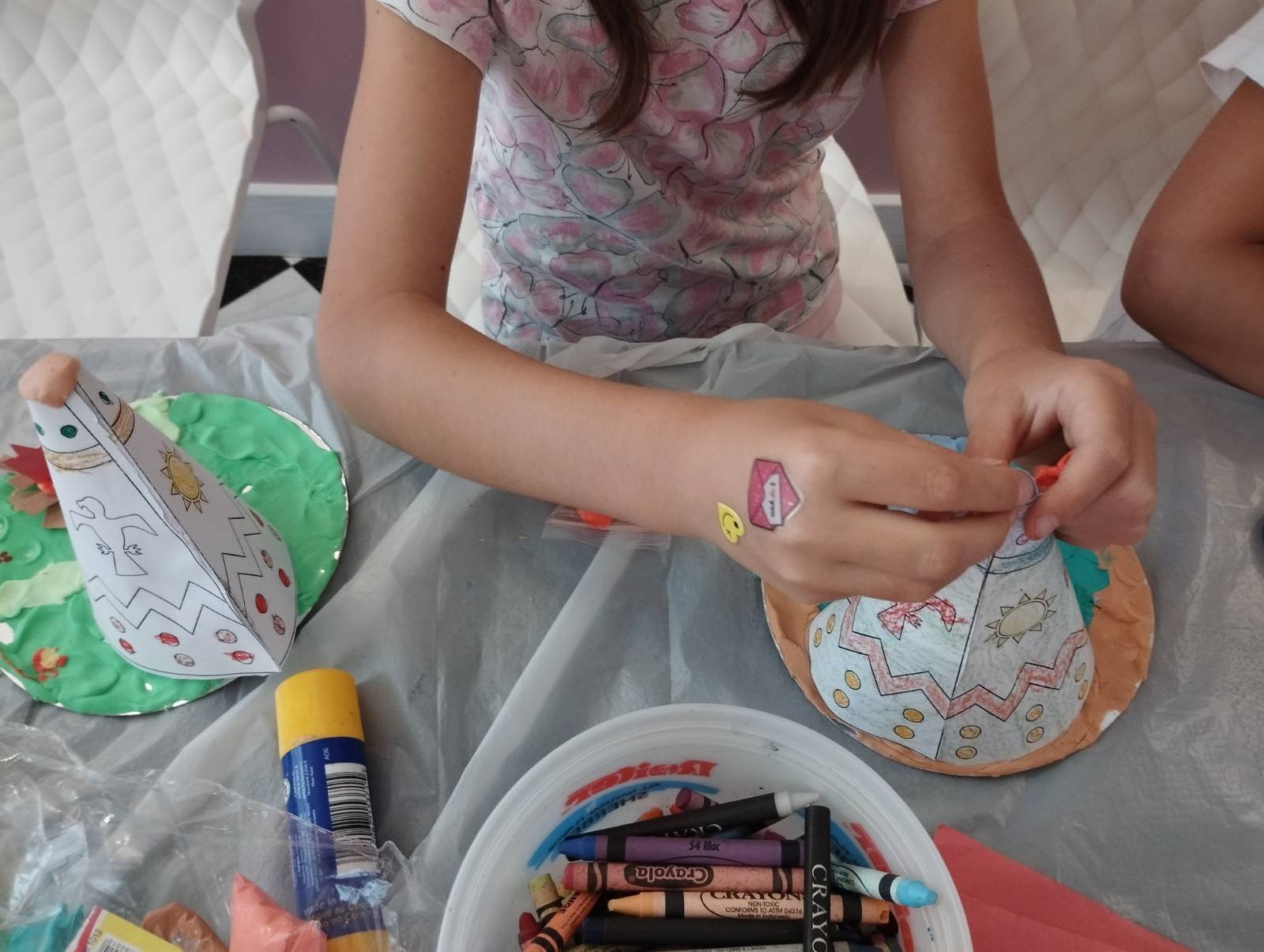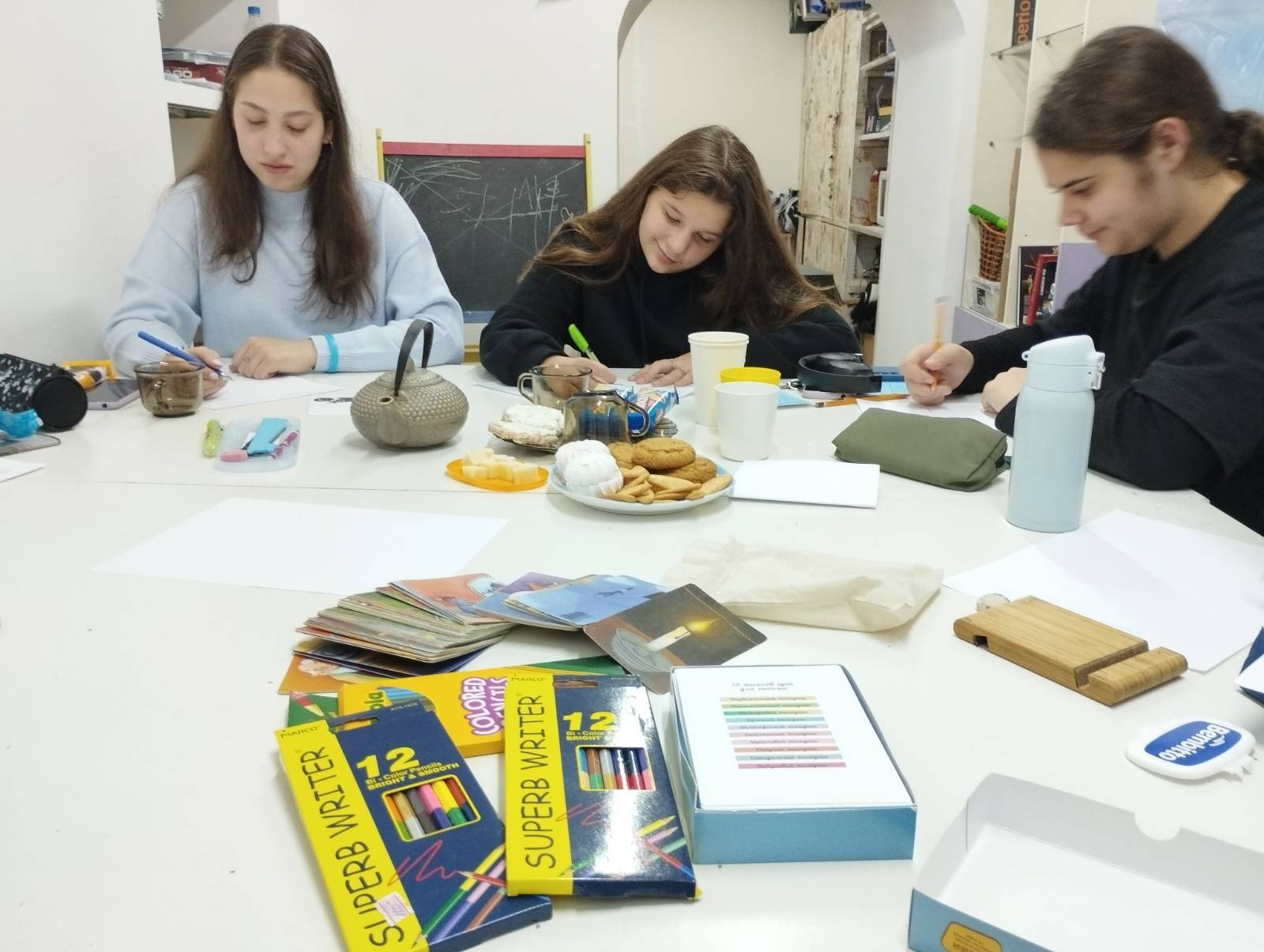- DTCare in Ukraine | Mental Health -
Group Art Therapy in Odesa
Trauma Healing Through Group Therapy
Group art therapy is a effective and holistic approach to treating individuals who have experienced severe trauma. As a form of psychotherapy, it combines the use of art-making with traditional talk therapy to help individuals process traumatic experiences. In a group setting, art therapy offers a supportive environment for individuals to express their emotions while fostering a sense of connection with others who have gone through similar experiences. This approach has shown to have numerous benefits, such as promoting self-awareness, reducing symptoms of trauma, and building coping skills. Group art therapy provides a powerful and transformative platform for individuals to navigate and recover from trauma. The casual group setting promotes collaboration among participants.
DTCare’s use of group art therapy sessions focuses on cultivating a safe and playful environment to help clients build confidence, encourage creativity, and develop a sense of community during the ongoing conflict. The group art therapy method has been proven to be helpful in processing grief, encouraging emotional expression, and better coping with crises, especially when working with children. DTCare's group art therapy sessions are free to ensure anyone in need can receive essential psychological support. DTCare’s experienced therapists, specializing in art therapy, run our group therapy sessions at the International Humanitarian University, hostels, IDP centers, and the Odesa Fine Arts Museum to support Ukrainian civilians, particularly vulnerable and at-risk groups, including women and children, through the trauma-healing process.
“Art therapy is a form of psychotherapy that uses art media as its primary mode of communication. It plays an important role in facilitating engagement when direct verbal interaction becomes difficult and provides a safe and indirect way to connect oneself with others.”
– Hu, Jingxuan et al. (2021)
Benefits of Group Art Therapy
1.
Enhanced Engagement
Invites a large group from one community to engage in a therapeutic art experience simultaneously.3.
Sharing Experiences
Attendees can share and relate to other individuals who may be processing similar experiences.2.
More Inviting
Group sessions feel more approachable than traditional therapy settings for reluctant clients.4.
Longer Sessions
Sessions are deliberately longer than individual sessions, allowing for deeper engagement with peers and art processes.Group Art Therapy in Action
Group sessions offer children skills of reflective abilities, empowerment, and an increase in their sense of self-efficacy. Art Therapy specifically designed for children impacts their mental learning and processing by encouraging the release of their negative and damaging thoughts and feelings to regulate their emotional state while strengthening their self-esteem, self-knowledge, and self-expression.
Group art therapy establishes a safe environment for children to be themselves which helps them to regain a sense of internal safety and restores inner resolutions. In addition, it creates communication between the therapists and the group. Each individual gains perspective from individual experiences in the context of how others are coping with similar situations. Group members serve as peer-to-peer support and points of connection to combat patient isolation.
Therapy for IDPs
Young girls from eastern Ukraine currently living in an IDP Center in Odesa work together to create jewelry from art supplies during an Open Studio art therapy session.
European Lyceum
In this “How Animals Feel” session, children metaphorically explored feelings through animals by selecting an animal, drawing a safe space for it, and assigning it a mood.
De-stress Session with Teens
A group of 14 teenagers joined DTCare at the European Lyceum in Odesa to de-stress. The session focused on the "Doodle" technique, which has proven effective in relieving emotional stress and anxiety.
Crafting “Comfort Dolls”
In this session, children created “comfort dolls” from wooden sticks and thread. The dolls symbolically protect children from their anxiety and fears.
Supporting Young Patients
A young patient at a children’s hospital enjoys himself during a small group art therapy session. The group discussed the change of seasons and what they are looking forward to in 2023.
Regional Clinical Children's Hospital
The art therapy session “My Island” is aimed at promoting self-confidence in children. In addition, this session helps the therapist determine the nature of the child's relationship with society to see how the child perceives the world.
Education Center Group Sessions
11 Children under 13 enjoyed experimenting with vibrant and bright “semolina” paint colors during a group art therapy center at an education center.
Valentine’s Day Session
In this session, children and women explored and celebrated the concept of love in light of Valentine’s Day. They used corrugated paper to create an array of hearts in the spirit of the holiday of love.
DTCare and Odesa Wow Project Support IDPs
An Eight-Week Summer Initiative for Displaced Ukrainian Families
In the summer of 2024, DTCare collaborated with the Odesa Wow Project to support internally displaced families in Ukraine. This initiative, spanning eight weeks, was meticulously designed to offer a holistic healing and empowerment approach for vulnerable communities affected by conflict. Central to the program was art therapy, a powerful therapeutic tool facilitating emotional expression and trauma processing for participants. Alongside art therapy, the program included dance classes, promoting physical expression and fostering a sense of community and joy, and safety awareness sessions, equipping families with essential knowledge and skills to navigate uncertain environments. This partnership with the Odessa Wow Project addressed immediate psychological needs, instilling resilience and hope in participants. The initiative empowered Ukrainian families by integrating creative expression with practical safety education, providing them with crucial tools to cope with abrupt changes and rebuild their lives.
DTCare and SandBoxKids
Bringing Healing and Summer Fun to War-Affected Children: The Impact of DTCare and SandBoxKids
In June 2023, DTCare was thrilled to support two summer camps in Lviv and Odesa, focused on enriching the lives of foster families and displaced children. These camps offer a variety of activities, including singing, campfires, talent shows, and more. Additionally, DTCare provided licensed art therapists to incorporate healing art therapy group sessions to process any trauma the families may have experienced. One of the camps, run by a Ukrainian NGO SandBoxKids, strives to provide opportunities for children from occupied territories, children of soldiers, and children of volunteers. One of DTCare's art therapists used free drawing techniques, play practices, collages, character creation, and toys to help the children process past traumatic experiences creatively and safely while fostering communication between them and their peers.
Art Therapy Demographics in Odesa
Not just children benefit from group art therapy. DTCare primarily helps children under 13 years of age through our group art therapy in Odesa (over 90% of our clients are children), but we are also committed to providing critical psychological support for teenagers and adults. Art Therapy practices specifically targeted at teens and adults help them reconnect with their younger selves, providing a soothing method for them to feel safe and obtain a playful mindset. Art therapy helps to restore balance in the body and mind while also helping to explain what is going on mentally after experiencing trauma. As a person gets older, oftentimes, verbal expression of one’s feelings, thoughts, or emotions becomes harder and more painful. Art therapy practices offer a nonverbal method for exploring and expressing these aspects while in a safe and supported environment.
Art Therapy offers patients skills that include reflective abilities, empowerment, and an increase in their sense of self-efficacy. One particular Open Studio was for displaced families living together in a community center to attend a group session at the Odesa Fine Arts Museum. Some attendees shared that though they only attended so their children could come, they were found to be enjoying themselves and admitted to learning some methods of destressing to help process their own personal trauma.
































